CHICAGO—Her first baby, a boy she planned to call Jaidan, arrived stillborn on June 25, 2009, the same day Michael Jackson died. More than three years later, when a second chance at motherhood finally came her way, Dwana Harris was determined to do everything right.

So last fall, Harris was intrigued when she unexpectedly met a woman bearing information about healthy child development in the living room of a cousin with a newborn. Soon the woman was visiting her, too, in the meticulously clean one-bedroom apartment that she and her boyfriend share in a South Side public housing tower near Lake Michigan.
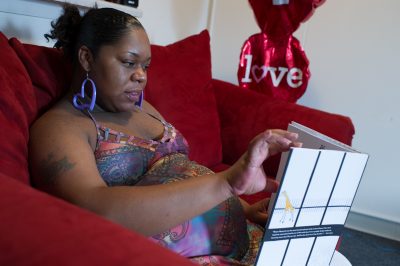
Harris, 28, had questions about what to ask at doctor’s appointments, what to eat and generally what to do to keep her unborn daughter on track. Her home visitor, Tammie Haltom, and a birthing coach named Sonia Collins had answers. They got her into a high-risk prenatal clinic at the University of Chicago, where Collins attended appointments with her. They persuaded her to cut back—way back—on the amount of Wild Cherry Pepsi she drank. They gave her children’s books like “Shades of People” and “The Itsy Bitsy Spider,” which she began reading to her belly.
The women work for the Ounce of Prevention Fund, a Chicago nonprofit that strives to stop the achievement gap for children in poverty from ever starting. That means beginning assistance at the first possible moment—in other words, before birth.
In recent months, President Obama has reignited the national conversation about early childhood education by proposing universal preschool for 4-year-olds from low- and moderate-income families. But with much of a child’s brain development occurring in the first three years of life, advocates at the Ounce and elsewhere say even that is too late, thrilled though they are by the preschool proposal. Poor babies as young as 9 months show a gap in cognitive development compared with wealthier peers, a gap that triples by the time they are 2 years old.
A less publicized part of the president’s plan would provide $15 billion over a decade for home visiting. The federal government has already provided $1.5 billion for home visitation under the 2010 Affordable Care Act, and states are funding the service for hundreds of thousands of families nationwide. But still only a small fraction of babies born into poverty receive this earliest intervention.
“We can remediate 3-year-olds and 4-year-olds, or we can get them right from the beginning,” said Diana Rauner, president of the Ounce, a $48.5 million organization that provides training and funnels public funding to 32 home visiting and doula (birth coaching) programs around Illinois, among numerous initiatives. “The remediation doesn’t work so well, even at that age.”
So how to get it right from the start? The crux of home visiting work is relationship building with a mother and, by extension, an entire family. To begin to alleviate poverty’s devastating effects on a child’s development, the thinking goes, a family needs a positive frame of reference for relationships. Provide a young mother whose life may be filled with chaos and drama with the opportunity to be heard and valued. Arm her with the information she needs to speak up in institutional settings, whether a hospital delivery room or a kindergarten class, and in personal relationships. Show her how to develop a baby’s vocabulary through reading, singing and stimulating conversation—starting in utero. Guide her to nurture her child and herself.
The result, if the strategy is successful, is that mothers in underserved communities are empowered to advocate for themselves and their children—and children grow up in more grounded, affectionate, engaging environments. Compare the school involvement of low-income parents versus affluent ones, and the differences lie in confidence levels and institutional knowledge. Look at children’s academic performance and life outcomes in general, and the emotional stability and cognitive stimulation they get at home are undeniably enormous factors.
But as with all relationships, the terrain is delicate and messy. It challenges families’ values and cultural norms. Result can’t be measured immediately, and many forces compete to undermine success. This is, after all, Chicago, where the potential horrific consequences of an unstable childhood are painfully evidenced in the city’s violent crime statistics, including a murder rate now declining after a surge in 2012 but still impacting youth disproportionately.
“If it were cheap or easy, we would have done it already at a great scale,” said Rauner, whose husband is a Republican candidate for Illinois governor. “But clearly, we think it’s the beginning of this great opportunity to really affect parent behavior, which really, in the long run, is the answer for children’s school success… If there’s another way to do this, I don’t know what it is.”
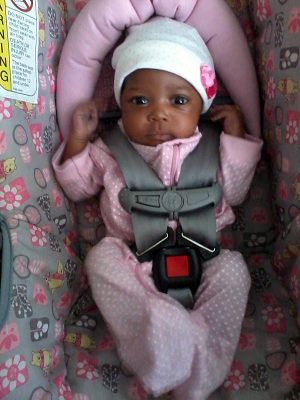
The Ounce helped to pioneer the idea of using doulas, or coaches in birthing and newborn care, as an intervention for impoverished teen mothers in Chicago nearly two decades ago. Two of three pilot sites in the mid-1990s are still in operation.
A few years ago, the Ounce began operating the Healthy Parents and Babies program in which Dwana Harris now takes part. It is funded by a $543,025 Early Head Start grant.
The program, similar to others the Ounce supports around the state, relies on two people with distinct roles to form relationships with a family. A doula supports the mother before, during and after delivery, promoting the initial parent-child bonding in the context of a longer-term home visitation program. A home visitor is a parent resource who works with the family through other formative experiences that can be equally trying, from sleep training to potty training to temper tantrums. “It’s a journey where even the most highly degreed and highly resourced of us feel like we don’t know, we’re just barely getting by,” Rauner said. Participants are also invited to join parent support groups.
Ideally the relationships last for years, until the child is enrolled in a high-quality preschool. The Ounce runs a model program in a national network on the South Side where Harris is interested in someday sending her daughter.
One of the program’s oldest parents, Harris is in many ways an ideal participant: independent, determined, and open to receive the organization’s teachings. Despite a busy schedule balancing her job as a home aide to the elderly with an online associate’s degree program in medical records administration, she made time during her pregnancy to attend meetings on everything from child discipline to mothers’ self-care to early school readiness assessment. She’s also had a longtime partnership with her baby’s father, James Jones, 34, who works in waste collection for the city and is studying to become a carpenter. Jones seems more comfortable in front of his Black Ops game on the Xbox than helping with stretches and massage exercises the doula showed them to relieve Harris’s low back pain in the third trimester. But he helps nonetheless and is there when she needs him.
For all Harris has going for her, she was petrified about something going wrong again in her impending dive into parenthood. And she reached for the support being thrown her way like a lifeline.
***
At the time of “my tragedy,” as Harris refers to her son’s stillbirth, she was newly back in Chicago after a year and a half in Iowa, where she worked at a meat processing plant and then on the assembly line at a cookie factory. She wanted her large family nearby during her pregnancy. She also liked the idea of her longtime doctor delivering her baby at Little Company of Mary Hospital and Health Care Center, near the Englewood community where she grew up.
But her experience was not what she had imagined. The doctor “was really busy,” said Harris, a soft-spoken perfectionist. “A lot of times I would come in and I couldn’t see him because he was out doing other things.”
She didn’t understand her options for pain medication during delivery, which was induced. “A lot of things went on that I didn’t like,” she said. “I didn’t know I had the option to tell them, ‘Hey, I don’t want that. I don’t want you doing that.’”
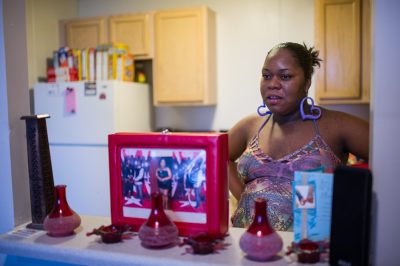
Nor does she understand what ultimately went wrong. “The actual cause of death that they told me [was] the baby didn’t have any fluid around him, any amniotic fluid,” she said. “I just thought that they probably should have noticed that a little sooner.” On her upper back, she got a tattoo of an angel holding a baby surrounded by the names of her son and his parents: Jaidan, Dwana and James.
Her second time around, at the University of Chicago’s high-risk clinic, she was relieved to get an update on her fluid levels during each of her monthly visits. Sonia Collins, her doula, eased some initial fears as well, dispelling the myth that reaching her arms overhead could cause the baby’s umbilical cord to wrap around her neck.
Still, she was scared, and for months, she refused to buy anything for the baby. On a Thursday afternoon in late March, eight weeks shy of her due date, Harris sat on her plush red couch with Collins, finally ready to pick out registry items in preparation for an April 27 shower her mother was planning at the family’s church. She didn’t want anyone feeling obliged to spend too much on her.
Harris was adamant about one thing she would not register for: bottles. She’d been won over on breastfeeding, even though it is not common among women in her family. The Ounce’s doulas and home visitors heavily promote the practice for its many documented benefits, including infant brain development and reduced risk of various diseases, allergies and possibly even SIDS. They often find resistance because of the cultural perception of breasts as sexual objects, the notion that breastfeeding is primitive, and the idea that if formula was good enough for them, it should be good enough for their children. It may help when the workers are the same race as the participant; the program often matches but doesn’t require it. Collins and Tammie Haltom, Harris’s home visitor, are both African-American, and Collins, 35, had a baby girl herself just over a year ago.
That day, Harris was proud of herself for having decided against a recommended amniocentesis test for Down Syndrome at a recent doctor’s appointment. Since she started getting more vocal with her doctors, she’s found, “a lot of times, their jaws drop, because they don’t understand how I know to ask these things…. Maybe it’s just a personal thing, but they sort of make you feel inferior.” She’ll know to ask questions now “if I decide to do daycare with [the baby], and when she goes to school, every aspect of her life where she can’t speak up for herself.”
Before becoming involved in the Ounce, Harris was already working to build a better life through education. She was due to get her associate’s degree from her online program at the University of Phoenix within weeks of her daughter’s birth. She wondered if it would be OK to take a newborn to a June 8 ceremony held locally for Midwest participants.
In the early 2000s, attendance problems made it hard for Harris to get through high school. She ended up finishing her degree at a National Guard-run boarding school 120 miles south of Chicago. She started community college to please her parents, who, though not together, provided relative stability. But she soon traded school for work, eager to make money to stay in the latest fashion. (She still dresses up when she goes to doctor’s appointments.) Over the years, she earned a pharmacy technician certificate but couldn’t find long-term work in the field, and she started culinary school. Hooked on the Investigation Discovery channel, she now hopes to pursue a bachelor’s and a career in criminal justice.
“Most of the influence right now in the outside world is that it’s not necessary to go to college. You can just become famous or something,” she said. Her advice to her unborn daughter: “You still want to be educated. Even if you have a talent, you still want to have something to be a backbone, something that could support you no matter what.”
***
Life circumstances are typically more overwhelming for the teenage mothers who were the original targets of the Ounce’s prenatal interventions and remain the majority of the 58 families served annually in Healthy Parents and Babies.
Celina Hernandez’s mother and grandmother were both teenage parents. Her mother was 15 when she was born, and Hernandez lived primarily with her grandmother growing up. She had lived with her mother for only one summer before last fall. By then she was 17 and pregnant. She needed her mom.
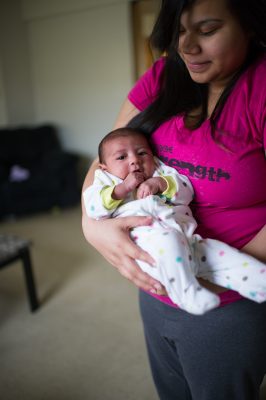
Her mom needed her, too, facing health problems while caring for three of Hernandez’s four younger siblings. They were seven under one roof—both Hernandez’s and her mother’s boyfriends had moved in as well—plus a little white dog named Oakley and a baby girl on the way. Their townhouse complex near Riverdale, in the southernmost part of the city, has been newly rebuilt by the Chicago Housing Authority. But Hernandez, who dreams of becoming a pediatrician but thinks a nurse is a more realistic goal, is pained by the sight of some neighborhood children in unwashed clothes. Her younger sisters and brother (the girls ages 12 and 7, the boy 5) are subject to teasing as some of the only Hispanics in a largely African-American area. And Hernandez’s commute to Kelly High School, which has provided important services for her learning disabilities, is miserable.
Before the birth of her daughter, she and her boyfriend, 28-year-old Alex Toledo, would leave at 5:30 a.m. to catch the No. 34 South Michigan bus, assuming it showed up. They would ride for 45 minutes to a Red Line train on the Chicago El. From there they could either transfer to another bus or switch trains and then make a final bus transfer, depositing Hernandez at school ideally by the 7:30 a.m. bell while Toledo continued another half hour to his job at a warehouse. Both were regularly late. Then Toledo lost his job, and Hernandez had to make the trip alone. The return ride takes even longer because of more frequent bus stops.
Hernandez, now 18, learned about the Ounce through a teen parenting support group at Kelly, where she is completing junior year primarily in self-contained special education classes. She was eager to give the doula and home visiting program a try, interested in learning about her baby’s development.
She liked how doula Patricia Ceja-Muhsen, 39 and Mexican-American like her, brought her fruit and granola bars and gave her tricks to ease low back pain. She appreciated being able to text her anytime. With a loving yet no-nonsense demeanor, Ceja-Muhsen offered information from years working with teen parents.
But Hernandez soon began to feel overwhelmed by everything the woman wanted her to do, even suggesting that she consider a natural childbirth with no pain medication. (Doulas are generally proponents of natural birth because it fosters an intense mother-child bond and sense of accomplishment, but they are trained to respect a mother’s wishes after providing the information. Most participants still get epidurals. Hernandez was no exception.)
The information Hernandez got from her doula sometimes conflicted with what her mother and even her doctor advised. Ceja-Muhsen said she emphasized that she wouldn’t judge her decisions. “I always tell my moms, ‘Whatever direction you go, I’m there to support you,’” she said.
Sofia Marie Toledo was born at 6:25 a.m. March 7 at Mt. Sinai Hospital after 23 hours of labor. She was 7 pounds and 13.2 ounces, with a full head of smooth dark hair like her mom’s and a round, cherubic face like her dad’s. At about a half-hour old, the baby wasn’t latching on to Hernandez’s breast. Ceja-Muhsen, who was there for the birth and had left the room briefly, said she returned to find her getting a bottle with formula.
“Patricia was expecting me to do a lot more than what the doctors told me to do,” Hernandez said later, as the doula was continuing to encourage breastfeeding. “My doctor understands how hard it is. She knows how far my house is, and school. So she told me, ‘If you feel like you can do it, do it. If not, don’t even bother pumping…’ And Patricia kept telling me to pump.”
Her mother’s reaction to the doula’s advice? “That lady’s crazy,” Hernandez said. “My mom has a funny sense of humor. Sorry.”
Ceja-Muhsen was also expressing concern about the newborn being exposed to secondhand smoke. Hernandez said both her boyfriend and her mother’s boyfriend smoke outside and in the living room. “They don’t listen,” she said. “They think that smoke won’t go [upstairs] through the vents.” She was embarrassed about Sofia’s clothes smelling like smoke when she took her to meet some extended relatives. Of Toledo, she said, “He’s trying to stop smoking… He has to.”
Toledo said he’s doing the best he can. He took care of the baby while Hernandez went back to school this spring following six weeks of home instruction. “It’s a little rough. I don’t get much sleep,” said the father, who also has an 8-year-old daughter.
With service intermittently shut off on Hernandez’s cell phone, she did not keep multiple appointments with Ceja-Muhsen after Sofia’s birth. They finally met for a mandatory postnatal visit with a nurse in late March, when Hernandez recommitted to participating.
“They said that they’ll help her, you know, to develop her brain,” Hernandez said in an interview that week. “I want her to be a smart baby. So that’s why I want to stay with the program.”
But by early May, as Hernandez was ending her time with Ceja-Muhsen and transitioning to work with a home visitor, another problem emerged: Home visiting hours end at 5 p.m., and she was not getting back from school by then. She dropped out of the program.
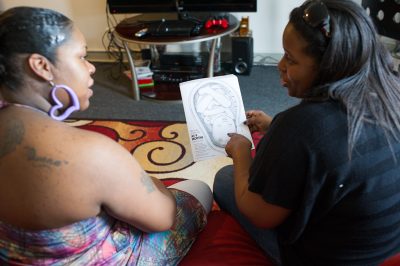
She still refers to a handout she received about how to make Sofia feel loved. She and Toledo read the baby Spanish and English books the doula brought them. They sing her “Twinkle, Twinkle Little Star” and a tune Toledo made up that seems to make her smile. Hernandez still texts Ceja-Muhsen with photos and questions, and she still gets encouraging responses.
But she’s frustrated that the program couldn’t accommodate her schedule. “I think they should be more flexible with their time,” she said. “They’re supposed to be there to help teen moms.”
Program administrators say they do their best to accommodate families’ schedules, but they encourage home visitors—who are paid an average of $27,000 a year—not to travel at night into high-crime areas, and many have young children of their own to get home to.
Nick Wechsler, who was one of the creators of the Ounce’s initial pilot programs with doulas in the mid-1990s and remains involved in the initiatives today, said a common cause of attrition is resistance from a baby’s grandmother, who sees the home visitor and doula as threatening her role. “What must it feel like to have Patricia walk into the house—a bundle of knowledge and energy and self-confidence—and confront a grandma who’s somewhere in her mind thinking, ‘I’m losing my daughter, … and you’re all positive about it, and you’re telling her things that I’m supposed to be telling her.’” At the same time, a worker can’t over-identify with the family elder, Wechsler said: “Then the teenager will discount you, because you’re lining up with the mom.”
Hernandez’s mother, who did not attend her appointments with Ceja-Muhsen but shared snacks with her during the delivery, declined to be interviewed.
***
Statewide in the programs the Ounce funds, 63 percent of participants stayed involved for six months or more, 45 percent stayed at least a year, 28 percent stayed at least two years, and 13 percent at least three.
While the goal is a long-term relationship, benefits can appear quickly. One study of two home visitation programs in Ohio found mothers had decreased depression and stress levels and an improved sense of competence in as few as 15 visits. The Ounce’s programs have high rates of breastfeeding, of teen mothers staying in high school and graduating, and of fathers present for babies’ births, which increases their likelihood of involvement in the children’s lives. The programs reduce teens’ chances of a second pregnancy within two years.
But can they close the achievement gap?
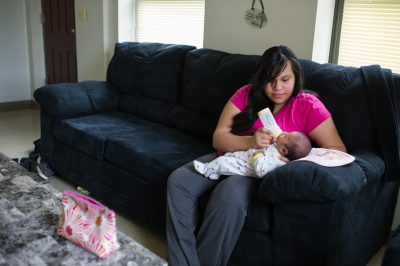
The University of Chicago is embarking on a major study of Ounce-funded programs that will measure their impact on parenting practices, maternal health and child health, including the family’s experience with domestic violence and the criminal justice system.
The one thing that the Chicago research won’t measure is a child’s later academic outcomes, since doing so would require tracking families over many years. So far no one has drawn the connections between doulas, home visitors and a child’s later test scores, but a link with school readiness seems not just plausible but obvious to those in the field.
A famous study in the 1990s showed that a child born into poverty hears 30 million fewer words than a child in an affluent family by the age of 3, producing a disparity in literacy preparedness that is often irreversible. Dana Suskind, a University of Chicago pediatric surgeon, is piloting something she calls the Thirty Million Words Project where home visitors train mothers to engage their babies in stimulating conversation and develop their vocabularies. “Babies aren’t born smart,” Suskind said. “They’re made smart by parents talking to them.”
If a child is playing with a toy horse, does someone point out a horse’s mane, a horse’s hooves and a horse’s fur? Does someone take an interest in what the child is doing and make him feel important?
When a young mother has everyone in her life—teachers, relatives, doctors, peers— talking at her in directives, she replicates those interactions with her child. “Who says, ‘Wow, how did you figure that out? That’s so cool; tell me about that….’ The art of the home visiting is how to develop deeper and deeper and more complex and more meaningful relationships with the families you work with to help give them experiences with language,” Nick Wechsler said.
Children’s “self-regulation,” or ability to control their behavior, predicts their educational outcomes and life outcomes generally. Landmark studies have shown that self-regulation skills develop through personal relationships and are often harmed by the stresses of poverty. The Berkeley researcher Mary Main documented that a trusting, secure relationship can make up for past breaches.
Getting any person—a mother, in this case—to change behavior is tricky business, but research documents that pregnancy is one of the most likely times for behavior change to occur. And Chicago Nobel laureate James Heckman has found that every dollar spent on preparing very young children to learn saves taxpayers $7 in the long run. The amount saved in social costs is already declining before kindergarten, and interventions produce progressively less payoff as children get older.
Regardless of what the future holds, the resilience Dwana Harris is developing proved invaluable when, on Friday, April 19, she went to the Chicago clinic for a routine ultrasound, and the doctors didn’t detect enough motion. They directed her to the labor and delivery unit, a month early. Rather than going along without question, Harris called her doula, Sonia Collins. She put Collins on speakerphone with the doctors as Collins began driving to the hospital. Then Harris agreed to be induced.
Physicians tried to deliver vaginally, but Harris wasn’t dilating enough and the baby’s heart rate wasn’t recovering quickly enough after dropping with contractions. Harris consented to a Caesarean section.
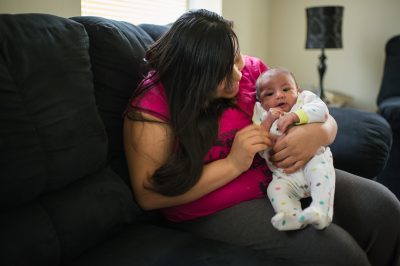
Jaid Destini Jones was born at 1:43 p.m. on Sunday, April 21. At 4 pounds and 2 ounces, she went straight to neonatal intensive care while her mother went to adult intensive care, undergoing another surgery to remove a blood clot and receiving several transfusions. Two days passed before Harris was able to get up and hold her baby. Her boyfriend, who has three older children, was afraid to hold a person so tiny, but he took a video of her on his phone to show Harris at her bedside. Her parents were also there through it all, her father also too scared to carry little Jaid.
The new mother was discharged from the hospital on April 24. While Jaid remained, Harris finished her final exams less than a week after her Caesarean. The exams had been due on the 21st, and her professors granted an extension. She attended her baby shower on April 27.
She tried to pump as much breast milk as she could while the hospital gave Jaid a formula in her absence. Getting back to the hospital was difficult for Harris, driving over potholes with fresh surgical wounds. For the first few days, “I just called every 20 minutes,” she said. Then she couldn’t stand it anymore. Each morning she would go, armed with the children’s books that her doula and home visitor had given her.
Sitting by the incubator, she passed the days reading to her daughter.
On Saturday, May 4, at last, Jaid was scheduled to be released. Harris thought she had completed mandatory hospital training on feeding, bathing and changing premature babies, including a CPR class. Then that morning, she awoke to a call that Jaid would remain hospitalized until Monday because no one had showed Harris how to use a special car seat the hospital loans out for babies less than 5 pounds. The person responsible for that part of the training was off for the weekend.
Highly upset, Harris called Collins, who told her she had the right as a parent to discharge her baby. “Because I spoke up and demanded that something be done about it, the doctor actually went on Google and learned how to train me to put the seat in the car,” Harris said. “Because I was not leaving without her.”
By June 8, Jaid was up to 7 pounds, strong enough for her father and grandparents to hold her in the audience as her mother walked across a stage to collect her associate’s degree.


Author Frances Swift (Old Blue Buggy) is a parent educator whose amazing blog is http://parentpulse.wordpress.com/
She also is the writer of the Helping Hands parenting card set available through Rezoom, 608-787-6061 or by writing 3039 S. 27th St, La Crosse, WI 54601